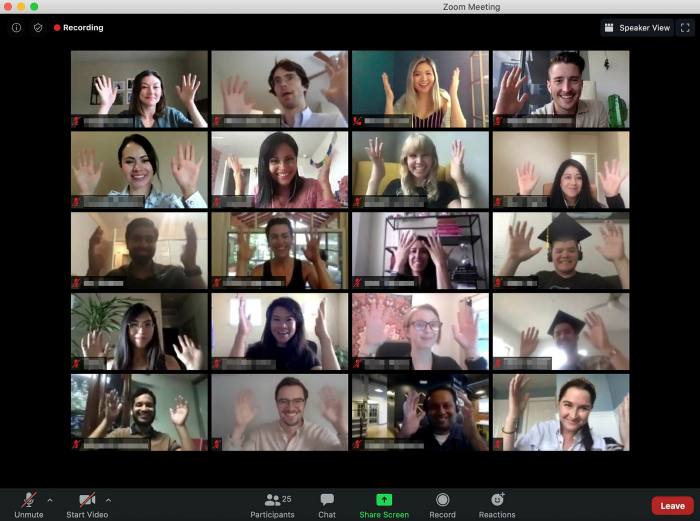As universities closed their school rooms and corporations altered to the disruption of the coronavirus pandemic past year, PepsiCo’s chief learning officer, Molly Nagler, had to scrap designs to send executives to programmes at Wharton University and Yale University of Administration.
But rather than dismiss government training as impractical, unaffordable or unjustifiable for the duration of a disaster, Nagler doubled down and negotiated on-line possibilities for the US-based mostly food and beverages group.
“We are inclined to use the in-particular person, campus-based mostly programme for executives to develop a differentiated experience and expose them to chopping-edge imagining and investigate,” she claims. “We’ll continue to use the campus for elite ordeals but considerably less than just before simply because of the price and the obstacle to get everybody in one particular position.”
Like lots of of her counterparts in corporations close to the planet, Nagler is not chopping back on her teaching budget. Instead, she is reconsidering who ought to discover, what they ought to review and how finest to coach them — and examining her option of exterior programmes.
Coronavirus imposed a sharp shock on business enterprise schools’ non-diploma “open” courses for professionals and bespoke “custom” choices for company clientele. Whilst demand from customers for skills these kinds of as the MBA has held up very well, the world college-based mostly government training market, well worth shut to $2bn in 2019, fell by a third in 2020.
François Ortalo-Magné, dean of London Business University, claims its government programmes created £50m a year just before Covid-19, but that total has due to the fact halved. “The pandemic has not been effortless,” he claims.
Michael Malefakis, head of government programmes at Wharton, agrees it has been a incredibly challenging time: “We’ve pushed ourselves and the market has pushed us far from our previous comfort zone. It is created us rethink how we structure and deliver training in a way that has not been as radical due to the fact planet war two.”
The excellent information for training suppliers is that hunger stays solid. Mark Roberts, affiliate dean of government training at Insead, attracts a distinction with the 2008 economic disaster, when teaching programmes had been witnessed as “something you change off as an price in a knee-jerk way”. He adds: “We have not witnessed that this time. One thing fundamental has shifted strategically.”

Furthermore, Nuno Gonçalves, chief learning and enhancement officer at Mars, has not witnessed his budget fall. “Every strategic paper I see talks about ‘people capabilities’, about what we need tomorrow,” he claims. “If we want to be thriving, we need to have these abilities.” Alongside “hard skills” targeted on electronic transformation and analytics, Gonçalves sees demand from customers for the “soft skills” that foster management traits these kinds of as empathy — and how to balance them with the continuing need for commercial results.
Josh Bersin, a US company learning marketing consultant, agrees that coronavirus has targeted corporations on “people issues” and away from management philosophies. “It’s about human-centred management which is a lot more caring,” he claims. Tied to this is range and inclusion, subjects that are “on employees’ minds, reporters’ minds, people of rankings, with shoppers choosing not to invest in goods from corporations that are not becoming honest. We have discovered range has barely been dealt with, and if something we have been backsliding.”
Alongside the acquisition of particular expertise, teaching programmes deliver a crack from the relentless pressures of day-to-day function in lockdown. “Companies are looking for significant engagements for staff that are not just about function or a Zoom bash,” claims Ortalo-Magné of London Business University. “We have presented time for individuals to chat with our college to convey them meaning as very well as learning.”
What do you believe?
The FT would like to hear from chief learning officers about their views on topics, budgets and ways of learning. Be sure to total our small study at ft.com/closurvey by March five. The outcomes will variety portion of our Government Education report in Might.
Matt Confer, a vice-president at Abilitie, a firm which delivers teaching these kinds of as business enterprise simulations, claims lots of clientele are intrigued in teaching simply because it aids with staff members retention and enthusiasm. “People have been at house a lot more than any of us wanted or expected and we’re having burnt out,” he claims.

Founded in 2015, Abilitie — which now delivers a mini on-line MBA — reported its finest two economic quarters in the 2nd 50 % of past year.
Whilst face-to-face meetings can develop a loaded learning experience not always replicable on-line, electronic seminars, courses and gatherings make it much easier to bring in both of those substantial-profile exterior speakers, these kinds of as hectic chief executives, and clientele who wrestle to choose time off for total-time review. Technologies has also produced considerably less scary signifies for individuals who are shy to discuss out.
Digitisation raises a broader difficulty for company learning officers about the “democratisation” of teaching. Whilst high priced on-campus programmes had been ordinarily minimal to a compact group of senior executives, on-line learning can offer a broader variety of teaching a lot more cheaply and competently to a far larger sized selection of staff members at unique ranges in an organisation.
FT study: Are you a working guardian? How has the pandemic impacted you?

The pandemic has turned everyone’s lives upside down, but it has been significantly disruptive for lots of dad and mom as they juggle function, housework and homeschooling. We want to know how it has been for you.
Be sure to fill out this variety. Your participation will be integral to our reporting.
Erin Clark, practice leader for management enhancement and learning at professional providers organization Deloitte, claims: “It’s about management at all ranges — something that can no more time be reserved for the pick couple of. Financial investment in establishing leaders was disproportionately anchored in hierarchy. Digital learning delivers the chance to be commonly out there.”
The demand from customers for on-line teaching is intensifying the competition amongst business enterprise universities and choice suppliers of government training — corporations which may well have considerably less tutorial heritage but which can be a lot more nimble. Deloitte, like other consultancies, recruiters and specialist companies, as very well as on-line educators from Abilitie to Coursera, are increasing.
Andrew Crisp, co-founder of the training consultancy CarringtonCrisp, claims the pandemic “is the close of luxurious learning, with the board at a five-star resort for a weekend”. Business universities, he thinks, “are going to have to sharpen up simply because the new entrants are a lot more fleet of foot in responding to customers”.
But Ravi Kumar, president of Infosys, sees a continuing need for engagement with universities, as they refocus on everyday living-lengthy learning. “They will have to pivot,” he claims. “Executive training was about refreshing what you had learnt. Now learning is about switching from one particular job or job to another. Education and function will be intertwined.”
The deserves of the virtual classroom

Just when Sumit Tomar was due to start out an superior finance training course at Wharton University in March past year, the pandemic pushed his government teaching totally on-line.
But the electrical engineer, who lives in San Diego, has no regrets. “The virtual classroom serves my demands beautifully,” he claims. “With the time difference, I can review from six.30am till 11am and then have enough time to do my day job right up until 8pm. If I have some urgent function, I can walk out and come back to watch the lectures yet again in the evening.”
Numerous business enterprise universities have experienced setbacks to their superior management programmes, with candidates discouraged by the forced shift to electronic learning. But Tomar was joyful to spend the total $67,000 fee and steer clear of the inconvenience and fees of vacation. “It’s not low-priced but it was certainly well worth the income.”
Tomar is chief government of pSemi, a semiconductor firm. He claims Wharton’s training course, furthermore a past one particular in typical management at Stanford a decade back, had been a substitute for an MBA.
“I could never imagine finding out total time: that’s two decades, a good deal of income invested and you are out of function. Whilst I’m working, I’m learning in parallel and making use of classes in the serious planet.”
He admits that “the bonds you construct in particular person are not the exact matter as a virtual cling-out”, but that the electronic format has created it achievable to bring in substantial-high-quality individuals from close to the planet, as very well as leading business enterprise figures inclined to discuss to his classes on-line.
He predicts the on-line format will help fortify the situation of leading universities. “Even if the pandemic is in excess of, the virtual classroom will not go away,” he claims.


![What is a marketing plan? Create your 7 step plan [Free guide]](https://justice4gemmel.com/wp-content/uploads/2022/11/What-is-a-marketing-plan-Create-your-7-step-plan-150x150.jpg)


![What is a marketing plan? Create your 7 step plan [Free guide]](https://justice4gemmel.com/wp-content/uploads/2022/11/What-is-a-marketing-plan-Create-your-7-step-plan-300x158.jpg)

More Stories
Important Factors To Consider For Discrimination Case Attorney
Elon Musk Leads By Example, Says He Coughed Up $8 For His Twitter Blue Check Mark
A How-To Guide On Getting Inside Of A Customer’s Brain